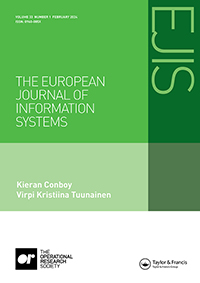更新EJIS字数限制
IF 8.6
2区 管理学
Q1 COMPUTER SCIENCE, INFORMATION SYSTEMS
引用次数: 0
摘要
对于那些以前向EJIS提交过稿件的人,你会看到我们现在允许作者提交比以前稍长的稿件。之前的指南指出,一篇典型的论文应该在5000到8000字之间(评论文章应该是13000字),包括摘要、表格、参考文献、图片说明、脚注、尾注。做出这种改变有几个原因。首先,我们发现许多首次提交的作品都超过了8000字。因此,这些限制无论如何都没有得到一贯的执行。其次,对于许多定性论文来说,8000字可能不够。第三,设置不一致执行的限制会创造一种顺从环境,让那些不了解“游戏规则”的人处于不利地位。例如,初级学者可能遵循这些规则,但后来才发现他们没有充分解释自己的研究。相比之下,资深学者可能会超过建议的字数限制,因为他们知道这样做几乎不会有什么后果。因此,这会造成不一致的评审体验。第四,正文的字数限制为1万字,但不包括参考文献,这意味着综述文章的推荐字数限制与以前大致相同。虽然我们增加了EJIS的字数限制,但请不要认为这是在邀请你写得很差。EJIS审稿人和编辑不喜欢华而不实,也不喜欢不必要的重复。因此,我希望继续收到精心制作的论文,少重复。我很感谢我们的一位资深编辑克里斯平•库姆斯(Crispin Coombs)在最近的董事会会议上提出了这个问题。本文章由计算机程序翻译,如有差异,请以英文原文为准。
Updating the EJIS word limit
For those of you who have submitted manuscripts to EJIS previously, you will see that we are now allowing authors to submit slightly longer manuscripts than before. The previous guidance stated that a typical paper should be between 5000 and 8000 words (13,000 words for review articles), inclusive of the abstract, tables, references, figure captions, footnotes, endnotes. There are a few reasons for making this change. First, we discovered that many first submissions are well over 8,000 words. Hence the limits were not being consistently enforced anyhow. Second, 8,000 words may not be sufficient for many qualitative papers. Third, having limits that are inconsistently enforced creates a submission landscape where those who don’t know the “rules of the game” are disadvantaged. Junior scholars, for example, might follow the rules only to find out later that they have not sufficiently explained their research. Senior scholars, by contrast, might exceed the recommended word limit, knowing that there will be few, if any, consequences for doing so. Hence, this can create an inconsistent review experience. Fourth, having a 10,000-word limit for the main text, but excluding references, means that the recommended limit of review articles is about the same as before. Although we are increasing the EJIS word limit, please do not take this as an invitation to write poorly. EJIS reviewers and editors do not like waffle, nor do they like unnecessary repetition. Hence, I hope to continue receiving well-crafted papers with little repetition. I am grateful to Crispin Coombs, one of our senior editors, for raising this issue at the recent board meeting.
求助全文
通过发布文献求助,成功后即可免费获取论文全文。
去求助
来源期刊

European Journal of Information Systems
工程技术-计算机:信息系统
CiteScore
23.10
自引率
4.20%
发文量
52
审稿时长
>12 weeks
期刊介绍:
The European Journal of Information Systems offers a unique European perspective on the theory and practice of information systems for a global readership. We actively seek first-rate articles that offer a critical examination of information technology, covering its effects, development, implementation, strategy, management, and policy.
 求助内容:
求助内容: 应助结果提醒方式:
应助结果提醒方式:


